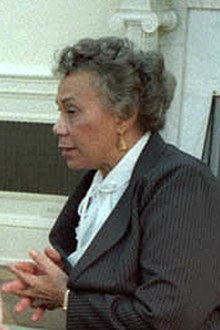| Dame Eugenia Charles DBE | |
|---|---|
 | |
| Prime Minister of Dominica | |
| In office 21 July 1980 – 14 June 1995 | |
| President | Aurelius Marie Clarence Seignoret Crispin Sorhaindo |
| Preceded by | Oliver Seraphin |
| Succeeded by | Edison James |
| Personal details | |
| Born | 15 May 1919 Pointe Michel, Dominica |
| Died | 6 September 2005 (aged 86) Fort-de-France, Martinique |
| Political party | Freedom Party |
| Alma mater | University of Toronto London School of Economics |
Charles was born in the fishing village of Pointe Michel in Saint Luke parish, to a "coloured bourgeoise" family.[1] She attended Convent School in Dominica, then, island's only girls' secondary school, and became interested in law while working at the colonial magistrate's court.[1] She worked for many years as assistant to Alastair Forbes. She attended the University of Toronto in Canada, before moving to the United Kingdom to attend the London School of Economics. She was a member of the sororitySigma Gamma Rho. She passed the bar and returned to Dominica, where she became the island's first female lawyer, establishing a practice specialising in property law.[1]
Charles never married nor had children, which caused friction for her in the male-dominated sphere of Caribbean politics. In 1991 she was made a Dame Commander of the Order of the British Empire.
Charles began campaigning in politics during the 1960s against restrictions on press freedom. She helped to found the Dominica Freedom Party (DFP), and was its leader from the early 1970s until 1995.[1] She was elected to the House of Assembly in 1970 and became Opposition Leader in 1975.[1] She continued serving after Dominica gained full independence from British rule in 1978.
Charles became Prime Minister when the DFP swept the 1980 elections, the party's first electoral victory. She took over fromOliver Seraphin, who had himself only taken over the year before after mass protests had forced the country's first prime minister,Patrick John, to step down from office. She additionally served as Dominica's Foreign Minister from 1980 to 1990, and also served as chairperson of the Organisation of Eastern Caribbean States (OECS).
In 1981 she faced two attempted coups d'état. That year Frederick Newton, commander of the Military of Dominica, organised an attack on the police headquarters in Roseau, resulting in the death of a police officer.[2] Newton and five other soldiers were found guilty in the attack and sentenced to death in 1983. The five accomplices sentences' were later commuted to life in prison, and Newton was executed in 1986.[2] Also in 1981, a group of Canadian and American mercenaries, mostly affiliated with white supremacistand Ku Klux Klan groups, planned a coup to restore former Prime Minister Patrick John to power. The attempt, which the conspirators codenamed Operation Red Dog, was thwarted by American federal agents inNew Orleans, Louisiana, and was soon facetiously dubbed the "Bayou of Pigs" after the failed Bay of Pigs Invasion.
Charles became more widely known to the outside world for her role in the lead-up to the United States Invasion of Grenada. In the wake of the arrest and execution of Grenadian Prime Minister Maurice Bishop, Charles, then serving as chair of the Organisation of Eastern Caribbean States, appealed to the United States, Jamaica, and Barbados for intervention.[1] She later appeared on television with U.S. president Ronald Reagan, supporting the invasion. Journalist Bob Woodward has detailed that millions of US dollars were paid to the Dominica Government by the US, some of which was regarded by the CIA as a 'payoff' for Mrs. Charles's support for the US intervention in Grenada.[3]
Charles and her party were considered conservative by Caribbean standards. However, many of her policies appeared centrist or even leftist by American standards; for instance, she did support some social welfare programmes. Other issues that were important to her were anti-corruption measures and individual freedom. For her uncompromising stance on this and other issues, she became known as the "Iron Lady of the Caribbean" (after the original "Iron Lady", Margaret Thatcher).

No comments:
Post a Comment